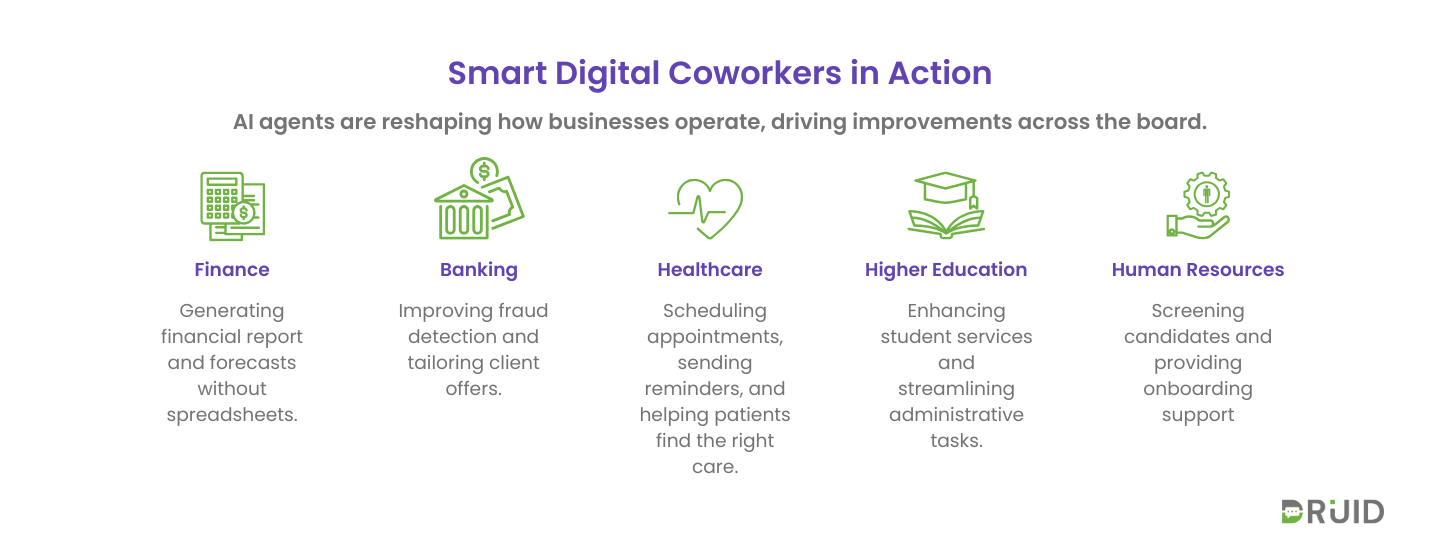Can Your Coworker Work 24/7 Without Snacks or Sleep?
Probably not, unless your coworker is a digital one. And not just any digital helper, but one of the new, shiny creatures of enterprise evolution: the AI agent.
We’ve all heard about bots, assistants, and maybe even “digital humans” (no, not your Zoom-fatigued intern). But what are AI agents, really? And why are people calling them autonomous AI agents and smart digital coworkers, like it's the next office buzzword after “synergy”?
Let’s break it down, jargon-free, drama-free, and with just enough caffeine-fueled clarity to get you up to speed.
"AI Agents are the ultimate digital teammates — they execute, learn, and adapt without burnout. In today’s fast-moving business world, deploying AI Agents isn’t just smart; it’s essential to stay competitive, agile, and customer-focused."
- John Wicks, Technology Automation Expert
What Are AI Agents? A Simple Definition That Won’t Make You Yawn
At their core, AI agents are software programs designed to perceive their environment, reason about it, make decisions, and take actions to achieve a goal, without constant human supervision. They don’t just follow instructions. They act independently, learn from experience, and adapt to changing conditions.
In the world of business, this translates to agents that can manage workflows, optimize operations, and even make suggestions to improve efficiency.
They’re not just “smart assistants.” They’re decision-makers.
Unlike traditional software that waits for you to push buttons, these digital folks handle tasks proactively and independently, like a really, really committed intern. Only smarter. And with a flawless memory.
Inside the Mind of an AI Agent: What Makes Them Tick?
Planning (Because Random Clicking Is So Last Season)
AI agents use advanced algorithms to assess tasks, break them down, and chart the best route to completion. This kind of reasoning is what makes them goal-oriented, not just reactive. McKinsey notes that the latest generation of AI-powered by Gen AI and LLMs, can now reason across functions, making them ideal for both strategic and operational roles.
Tools (Yes, They Have Their Own Digital Toolbox)
These agents can connect with APIs, CRMs, ERPs, and other enterprise tools, creating a seamless bridge between departments and data (REVE Chat). This ability to “work across platforms” makes them more than helpers; they’re systems integrators in disguise.
Memory (Never Forgets Your Birthday. Or That You Missed the Last Status Call)
Thanks to embedded memory systems, AI agents can recall past interactions and apply previous learning to new situations. This isn’t just about remembering your coffee order, it’s about identifying workflow inefficiencies, user preferences, and recurring issues before they snowball.
Types of AI Agents (Meet the Smart Digital Coworkers)
Not all AI agents are created equal. Some are quick responders, some are deep thinkers, and some can practically run a department.
- Reactive Agents: Respond instantly but don’t store past information. Ideal for simple, real-time responses.
- Goal-Based Agents: Operate with clear objectives and adjust behaviors to meet them. Kind of like your KPIs, but faster.
- Learning Agents: Adapt over time based on what works. These are your long-term smart digital coworkers who never stop improving.
- Travel & Hospitality: Assisting with bookings, handling rescheduling, and providing personalized recommendations to travelers.


So Why Do They Matter?
The short answer? They’re efficient, scalable, and just a bit superhuman. The longer answer? Because they’re transforming how work gets done across departments and industries.
According to Liberty Global’s personal experience with AI agent implementation, the company swapped out time-draining admin work for smarter, knowledge-based tasks by going digital, and not just by slapping a chatbot on their website. They built real-deal AI agents that could take action, not just talk. The result? Less busywork, more brainwork, smoother operations, and stronger customer relationships. It turns out that when your tech partner actually understands how things work in the real world, you get more than automation. You get progress.
Organizations that embrace AI agents see huge improvements in speed, personalization, and cost-efficiency. These agents form the core of AI-powered organizations, businesses that are more agile, adaptive, and productive than ever before.
And McKinsey backs it up with numbers: the potential annual value of generative AI and agent-based systems across industries could exceed $4.4 trillion. Yes, with a "T".
How Are Smart Digital Coworkers Changing the Game?
You don’t hire an AI agent to chit-chat. You hire them to do the work, the kind that clogs up your team's schedule, slows down your processes, and makes your operations feel like a never-ending game of digital whack-a-mole. You use them to create modern business strategies and gain insights into your customers like never before.
Smart digital coworkers:
- Cut down manual labor
- Connect data silos
- Elevate user experiences
- Scale services 24/7 without hiring additional staff
They’re not replacing your team, they’re freeing your team to focus on meaningful, strategic tasks. Think fewer “Where’s that file?” messages and more “Wow, we crushed this quarter.”
Real Talk: Where Are AI Agents Actually Being Used?
Retail
From hyper-personalized shopping experiences to fully automated returns, refunds, and complaint resolution, AI agents are helping retailers serve customers faster, smarter, and around the clock, without burning out staff or missing a beat in inventory tracking.
Example Use-Case: Intelligent Return Automation
AI agents can orchestrate the entire returns process - initiating return labels, updating inventory systems, issuing refunds, and notifying customer service teams. Through tight integration with ERP, payment, and CRM platforms, the experience becomes seamless both for customers and internal teams, cutting return handling time by over 40%.
Finance
AI agents are taking over high-stakes, low-glory tasks like compliance checks, fraud monitoring, and risk analysis. They can spot anomalies, flag suspicious transactions, and generate audit trails in seconds, freeing up analysts to focus on strategy, not spreadsheets.
Example Use-Case: Automating Accounts Payable and Procurement Workflows
AI agents are streamlining finance operations by automating invoice processing, purchase approvals, and supplier onboarding. With deep system integrations and secure orchestration, they validate invoices, trigger payment workflows, and ensure compliance with procurement policies, cutting costs and accelerating cycle times.
Telecom
They’re the unsung heroes behind the scenes, detecting outages before customers call, automating network diagnostics, and handling routine service requests. AI agents in telecom don’t just improve customer experience; they help reduce support costs and prevent churn.
Example Use-Case: Proactive Service Recovery
Telecom providers deploy AI agents that detect potential service disruptions before customers complain. Through advanced orchestration across network monitoring tools, ticketing systems, and field service platforms, the agent can escalate issues, dispatch technicians, and update customers automatically, reducing downtime and improving loyalty.
HR
Hiring, onboarding, leave requests, policy questions, you name it. AI agents in HR are streamlining it all. They provide instant answers to employees, automate repetitive workflows, and ensure new hires hit the ground running. Less paper-chasing, more people-first focus.
Example Use-Case: Seamless Employee Onboarding
AI agents in HR can manage the full onboarding lifecycle - sending documents, collecting signatures, scheduling IT setups, and connecting new hires to internal knowledge hubs. With integration into HRIS, LMS, and IT provisioning tools, and governed through clear lifecycle management, HR teams ensure a consistent, secure onboarding experience without drowning in manual checklists.
Higher Education
Universities are using AI agents to manage admissions inquiries, guide students through course selections, and even offer academic support. They're bridging the gap between stretched admin staff and tech-savvy students who expect 24/7 answers without the 48-hour email wait.
Example Use-Case: Personalized Student Support
Universities use AI agents to manage inquiries, course registration, and resource recommendations. Powered by orchestration between student databases, knowledge management systems, and campus service portals, the agent ensures each student gets timely, relevant support, improving satisfaction while reducing administrative overhead.
Banking
AI agents are transforming banking from branch-based to on-demand. Whether it's verifying identity, processing loan applications, or managing customer support, they handle it securely and swiftly, giving customers convenience without compromising compliance.
Example Use-Case: Secure Identity Verification
Banks are deploying AI agents to automate identity verification during customer onboarding and loan processing. These agents combine security and governance by integrating KYC (Know Your Customer) checks, risk scoring, and document validation into a compliant, auditable workflow, without exposing sensitive data or bottlenecking service times.
Healthcare
Scheduling, follow-ups, intake forms, insurance verification, AI agents are lightening the admin load so that medical professionals can focus on what they do best: care. They reduce wait times, increase accuracy, and ensure critical information doesn’t fall through the cracks.
Example Use-Case: Patient Intake and Pre-Visit Coordination
Healthcare providers can leverage AI agents to automate patient intake, collecting medical histories, insurance details, and consent forms. These workflows use secure integrations with EMR (Electronic Medical Records) systems, ensuring governance of sensitive data and preparing care teams before patients even walk through the door.
And according to a recent Forbes-featured report on LinkedIn, organizations that have deployed autonomous AI agents saw a 15–30% boost in operational efficiency within six months. That’s not a footnote, that’s a business case.
Final Thoughts: You Might Not Know Them, But They’re Already Working With You
Whether you're just learning what AI agents are or you’re looking to overhaul your processes with autonomous AI agents, one thing is clear: the future of work is collaborative, and yes, it includes smart digital coworkers who don’t steal your lunch from the fridge.
They're changing the way we work, from how we solve problems to how we scale operations. And if you’re not at least considering onboarding one? You might just get left behind in the analog dust.
Curious how smart digital coworkers are already transforming industries like HR, customer service, banking, and beyond? Head over to our blog to explore how AI agents are reshaping the future of work, one automated workflow at a time.
FAQs
What are AI agents in simple terms?
They’re software programs that can independently perform tasks, make decisions, and adapt to new information, like a really efficient virtual assistant with a brain.
How are autonomous AI agents different from chatbots?
Chatbots follow scripts. Autonomous AI agents think on their feet (or circuits). They reason, plan, and act with minimal supervision.
Can smart digital coworkers be tailored to my industry?
Absolutely. DRUID’s AI agents are built to fit your specific workflows, platforms, and business goals.
Do AI agents need IT support to function?
Minimal. With DRUID, business users can configure and deploy agents without depending entirely on IT.
What’s the ROI of adopting AI agents?
Faster processes, reduced operational costs, and improved employee/customer satisfaction. Oh, and you get to look very cool at your next board meeting.
Why should I choose DRUID?
We don’t do one-size-fits-all. Our smart digital coworkers are built for enterprise complexity and designed to deliver measurable value fast.




